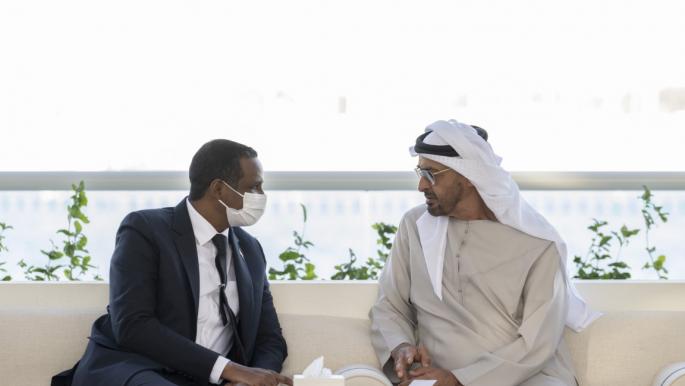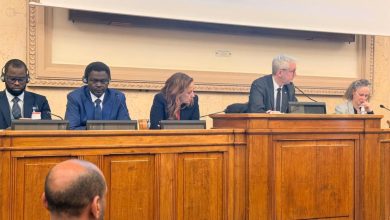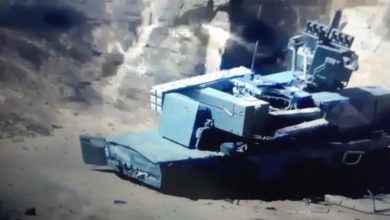Reports
Attempts to Mend the Rift Fail: Widening Division Between the Militia and Its Allies

Sudan Events – Agencies
For the first time, rifts between the leaders of the Rapid Support Forces (RSF) militia and the Tagaddam Coordination Group have surfaced publicly, following covert and overt coordination since their signing of the Addis Ababa Agreement in January.
During this time—and even before—the cooperation between Tagaddam and the RSF appeared smooth and flexible in private. However, publicly, Tagaddam leaders maintained a façade of neutrality. This contradictory stance, according to observers, frustrated RSF leaders, causing occasional public outbursts against Tagaddam, especially when any member condemned the RSF’s violations, as was the case in the denunciation of the Wad Al-Noora atrocities.
In retaliation, RSF loyalist activist Maryam Ahmed leaked files allegedly showing payments received by some Tagaddam leaders, signed by Goni Hamdan Dagalo. Although Maryam quickly deleted these files from her Facebook page after delivering the message, the incident pressured Tagaddam leaders to condemn the army first in any violations before reluctantly condemning RSF abuses, often attributing them to rogue elements. This pattern was evident following the Takina massacre, which claimed hundreds of lives at the hands of the RSF.
A Transitional Stance
Experts suggest that while Tagaddam’s ambiguous stance may not satisfy the RSF leaders who finance the group’s activities, it fosters a semblance of solidarity within a vast sea of hostility. However, as analysts point out, this pragmatism is inherently fragile and subject to shifting operational realities on the ground. With the army’s recent victories across various battlefronts, cracks in Tagaddam’s stance have inevitably begun to show.
Collective Fallout
Dr. Omar Osman, a political science professor at Sudanese universities, believes that the RSF’s initiative to form a government in its controlled areas is a ploy to entangle and embarrass Tagaddam leaders rather than a genuine goal. The RSF, recognizing its imminent military defeat, seeks to implicate Tagaddam by extracting its approval for forming a government in militia-held regions. Osman notes that this option was feasible months ago when the RSF still controlled larger territories.
Currently, the army has encircled Wad Madani and needs only days to fully secure Al-Jazirah. In Khartoum, Omdurman has fallen from RSF control, and Bahri is following suit, leaving only Khartoum city and East Nile locality. With battles approaching these areas, they are unsuitable for forming a government. Osman suggests the RSF might establish a temporary government in four of Darfur’s five states, though Tagaddam would neither support nor participate in such an endeavor.
Position on the Proposed Government
Tagaddam’s head, Abdullah Hamdok, has delegated the decision on forming a government in RSF-held areas to an internal committee. Meanwhile, Sudanese Congress Party leader Omar Al-Diqair has rejected participating in such a government, describing it as reinforcing Sudan’s division. However, other leaders, such as Mohamed Hassan Al-Taishi, Taha Osman, and Ibrahim Al-Mirghani, have agreed.
The disagreement lies in the nature of the proposed government. While Tagaddam seeks a civilian-led government in the occupied states that the RSF would merely guard without overt involvement, RSF leaders want the government to bear their name and include Tagaddam members, similar to Sudan’s legitimate government.
Harsh Criticism
In a bid to resolve the impasse, Yusuf Ezzat, a former advisor to the RSF leader, attacked Tagaddam. In a post on X (formerly Twitter), Ezzat stated:
“Any entity, group, or individual wishing to participate in a civilian government in RSF-controlled areas must first acknowledge the RSF and fight alongside them to earn the right to power, as our youth have paid their dues.”
He added, “The idea of forming a civilian government in RSF-held areas is an attempt by some—hinting at Tagaddam—to avoid taking a clear stance on the conflict while hiding behind a civilian facade.”
Ezzat insisted, “Any government formed must be led by the known RSF leader and include stakeholders who have paid the price of this war.”
Ibrahim Saghayroon, an RSF leader, echoed similar sentiments, addressing Tagaddam:
“You want to form a government that we protect with our people, while you take power under the guise of civility without openly supporting or believing in the RSF.”
Growing Rift
Observers view these public attacks as just the tip of the iceberg, predicting more scandals and hidden conflicts to emerge. Tagaddam leaders, according to analysts, are unlikely to gamble on participating in an RSF-led government—not out of principle, but due to the realization that the RSF has effectively lost its foothold on the ground.
Participation in such a government would spell the end of Tagaddam as a political force, sealing their fate alongside the RSF, whose demise the Sudanese Armed Forces are currently finalizing.
(Source: Sudanese Echoes)



